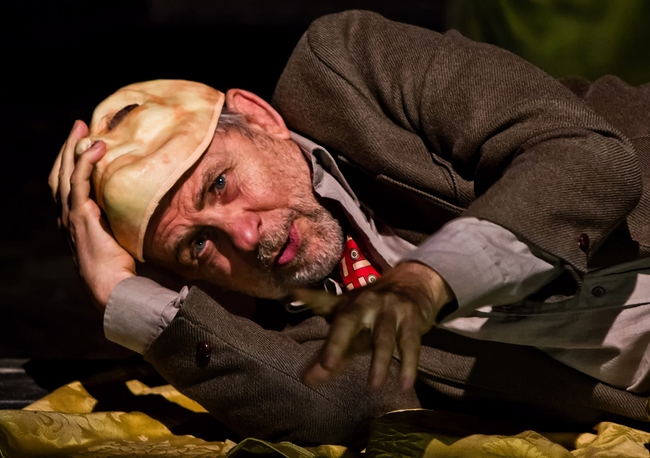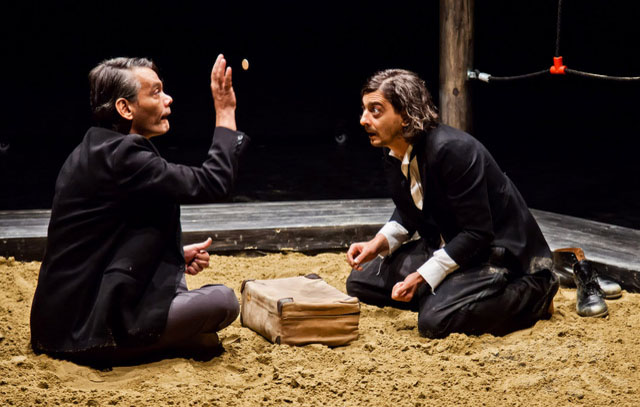A review of Szkéné Theatre’s production of Tom Stoppard’s Rosencrantz and Guildenstern Are Dead (dir. Szikszai Rémusz) by Bozóki Vivien
Concerning Tom Stoppard’s rather absurd play Rosencrantz and Guildenstern Are Dead, I would hardly dare to declare anything. Hardly anything, except for the following: the performance at Szkéné Theatre, on the 12th of October 2015, for me, was certainly about death. Once again, the performance was about death, and although I’m going to support my interpretation with examples both from the performance and the text, I wouldn’t be as brave as to state that Stoppard’s play is about death. One of its themes might be death, but as I’m going to explain, my feeling is that there is much more to this play, and death is only one of many possible interpretations.
Not only the horror film-like music, the creepy sounds of the performance and the skull-like masks of the actors made me think about death, but also the comments of Rosencrantz and Guildenstern. The first to start was Rosencrantz, who asked Guildenstern horrible questions like “Do you ever think of yourself as actually dead, lying in a box with a lid on it?”. At first Guildenstern regards these questions as nonsense, but towards the end of the play he as well starts to make more sophisticated, but still weird comments on death. On top of that comes the most breathtaking, most frightful moment of the play I think, when Guildenstern makes a furious speech to the actors with a thunderous voice, trying to kill the Player afterwards: “I’m talking about death – and you’ve never experienced that. And you cannot act it. . . . No one gets up after death – there is no applause – there is only silence and some second-hand clothes, and that’s – death.”
After a post-performance re-reading of parts of the play, I made an interesting discovery. What struck me was that apart from the fact that there is a lot of conversation going on about death, Stoppard has inserted the word “dead” into some of Guildenstern’s sentences. Some of the examples include “time has stopped dead”, “stop this thing dead”, and one of Guildenstern’s stage directions says that he “stops pacing dead”. Realizing this, I felt an urge to count how many times the words “die”, “death”, or “dead” come up in the play, and after checking twice, I found that the sum of these occasions add up exactly to one hundred. It might or might not be intentional, but the fact that a form of the word “death” appears one hundred times in a sixty-five-page-long play, is suggestive I think.
Now that I introduced why I think the performance and the play is about death, let me turn to my interpretation. There are two men, who are made conscious of the fact that there is a plan greater than them, which they are parts of. This great plan or event is death, which is in the calendar of every human being, written with invisible ink, with no way to erase it. This is the incomprehensible fact that Rosencrantz and Guildenstern realize in the play, and their different attitudes towards this realization represent different people. People like Rosencrantz joke around, don’t take things seriously, and want to enjoy life, and people like Guildenstern take things seriously and try to find a meaning, but in the end, it doesn’t really matter because life is the only thing we have. Because when it ends, nothing remains of most of us, we just disappear, and in a hundred years or a couple of centuries, no one is going to remember us, individual people, and this is the horrible reality that some viewers might experience watching this performance.
To assuage the tension in you, dear reader, I would like to briefly present another, more optimistic interpretation of the performance. This interpretation appears if we don’t take death literally. Benjamin Franklin once famously said that many people die at twenty-five and aren’t buried until they are seventy-five. This means that there are many people who – like Rosencrantz and Guildenstern – fail to make conscious decisions concerning their lives. These people are unable to say no, who do what society expects them to do, so their lives are simply whirlwinds of uncontrolled events. These are the people who say that they would like to have the opportunity to travel, but who do nothing the achieve it. These are the people who are annoyed about their weight, but complain that they don’t have enough time for exercise. These people are living in the bleak dream that they cannot change their lives because they have no time, no money, or no talent. In other words, they live their lives as if they were sleeping, or as if they were dead.
There are many people like this, in fact there are even more people who think they are capable of changing an aspect of their lives, but say they can’t control some other aspect, existing partly alive, partly dead. And there comes the most brilliant part: one can be awakened from this kind of death. The keys to resurrection are simply becoming conscious and then taking action. Stoppard’s play or the performance at Szkéné with Gábor Nagypál, Gergő Kaszás and Tamás Fodor (see full cast here) has the wonderful ability to make people conscious.
Read our other Rosencrantz and Guildenstern Are Dead reviews here, and all theatre reviews here!
Images taken from Szkéné Theatre’s Rosencrantz and Guildenstern Are Dead gallery, photographed by Mészáros Csaba.




